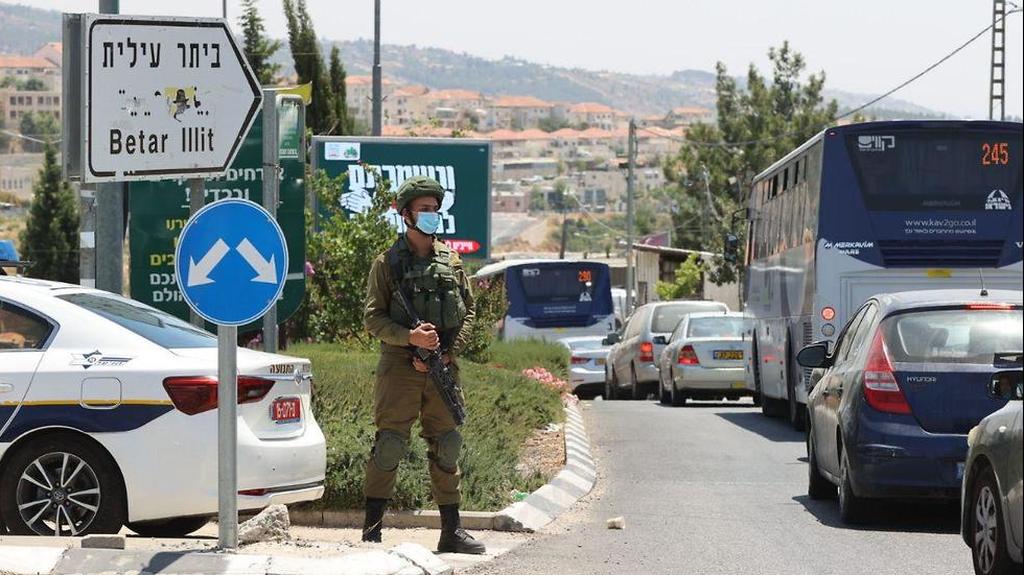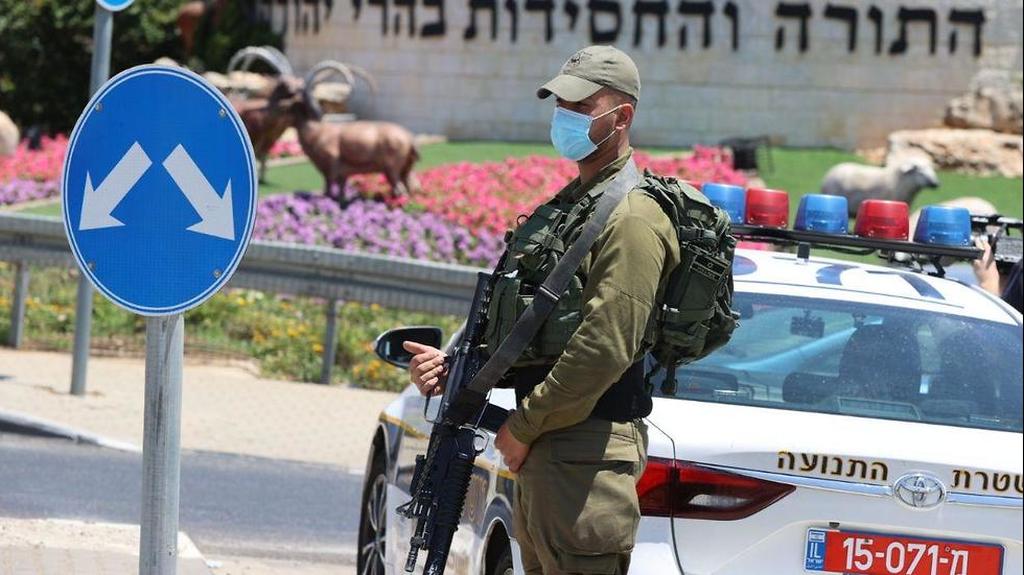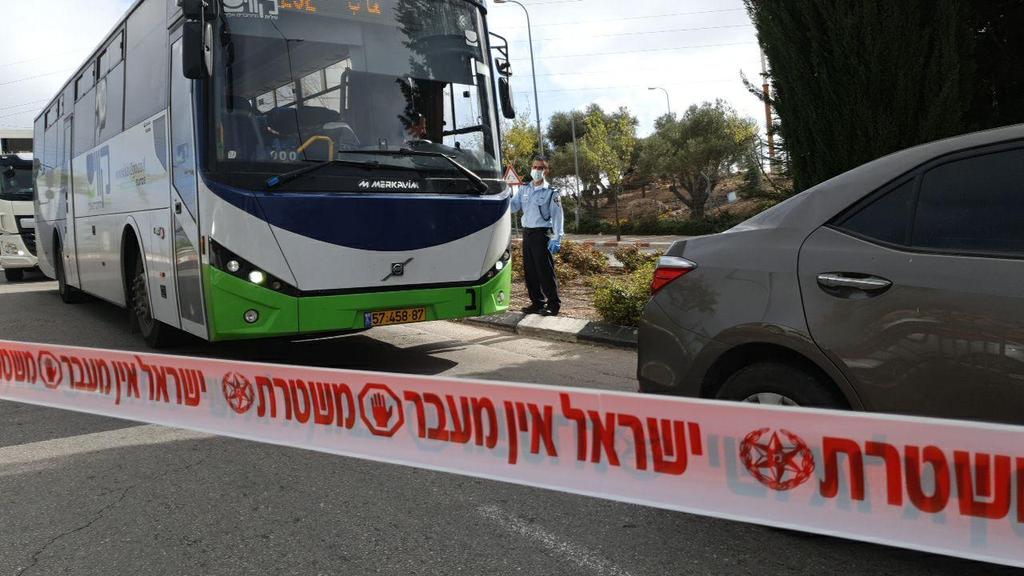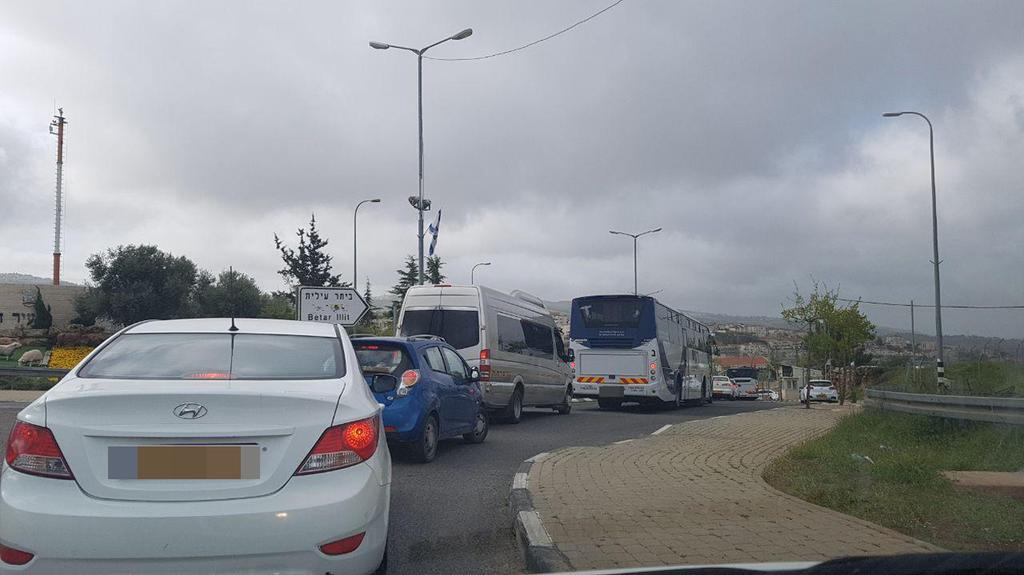Many residents of the West Bank settlement of Beitar Illit fled their homes on Wednesday at the community went into lockdown to stem the spread of a coronavirus outbreak.
Betar Illit has seen the biggest outbreak in the country, prompting the government on Tuesday to declare an overall closure there.
5 View gallery


A soldier prepares for the closure in Beitar Illit as residents flee
(Photo: Amit Shabi)
At least 280 people in the settlement have tested positive for coronavirus in recent weeks, with 16% of the tests conducted there giving a positive diagnosis – three times the national average.
Many of the residents rushed to avoid being caught up in the measure that came into effect at 1pm Wednesday, creating a huge traffic jam at the exits from the ultra-Orthodox settlement.
"I'm running away while it is still possible," said one resident. "There is nothing else we can do; we will be back in a week."
Many of the residents lamented the closure, calling it a drastic measure that was forced upon them.
"I studied the data," wrote one resident in the settlement's WhatsApp group. "Givatayim has had a 20 percent increase [in infections]; 48 families [with at least one virus carrier] do not justify closure for 10,000 families, 62,000 residents."
5 View gallery


Members of the security forces oversee the closure in Beitar Illit
(Photo: Amit Shabi)
Dana Varon, another resident of Betar Illit, believes the closure will only make things worse.
"They're cultivating a coronavirus nursery here. You can't tell a family of nine to be in lockdown when the father is sick with the coronavirus," she said.
"He'll infect everyone; all his children will be wandering around the closed city and everyone will get sick. Those who are infected should be sent to hotels."
MK Naftali Bennett, who arrived at the settlement a few hours before the closure began, said that closure was not the solution, and the afflicted should instead be relocated to hotels requisitioned for coronavirus patients.
"Together they [the residents and the municipality] formulated an action plan that essentially evacuated the 280 coronavirus carriers to hotels within 48 hours, and before Shabbat," said Bennett.
"The evacuation is necessary because the family structure and apartments in the city do not allow effective isolation in the residents' own homes," added Bennett.
"The next 48 hours will decide the fate of Beitar Illit. Be it storming the city and cleaning it of the coronavirus, or losing control and turning the city into a coronavirus den with thousands of infected," he said.
"It is fake news," said Beitar Illit Mayor Meir Rubinstein. "The closure does nothing but incubate the virus and multiply the number of patients."
Rubinstein said he was powerless in the face of directives from the Health Ministry and the authorities.
"Last week, [Health Ministry No. 2] Prof. Itamar Grotto called me and informed me that they wanted to impose restrictions on the city. The next day, the director-general of the Health Ministry issued two restrictive orders - one to shut down the schools and the other to limit gathering to no more than 11 people," he said, adding that these are restrictions that do not appear on the Health Ministry website.
"If we could have evacuated our sick to hotels like we did during the first wave, we would have not reached these numbers," he said.
"Every verified patient at home is a ticking time bomb. The most basic thing is to evacuate patients to hotels, and they want to evacuate, so what is the reason for the delay?" Rubinstein said.
According to the mayor, every resident of the settlement adhered to health regulations and wore a mask at all times:
"The infection started here as it started all over the country," he said. "Before testing began, the first patients infected their siblings at home. If we had evacuated those first patients to hotels, we would have avoided closure."
While the settlement's yeshivas (Jewish religious educational institutions) shut with the announcement of the first contagion, its synagogues are still operational.
"The rate of infection is zero in the synagogues," said Rubinstein.
"Most of the infections come from the first patients infected at the schools, and if they had been evacuated to hotels, we would have been spared this entire ordeal."
Rubinstein said that restricting people in their homes would only serve to spread the infection, while also ruining local businesses.
"People will have their livelihoods and lives destroyed," he said.
"It will only double the infection rate because everyone will be closed in their homes, then the kids will go out and play together. What will happen here then?"




